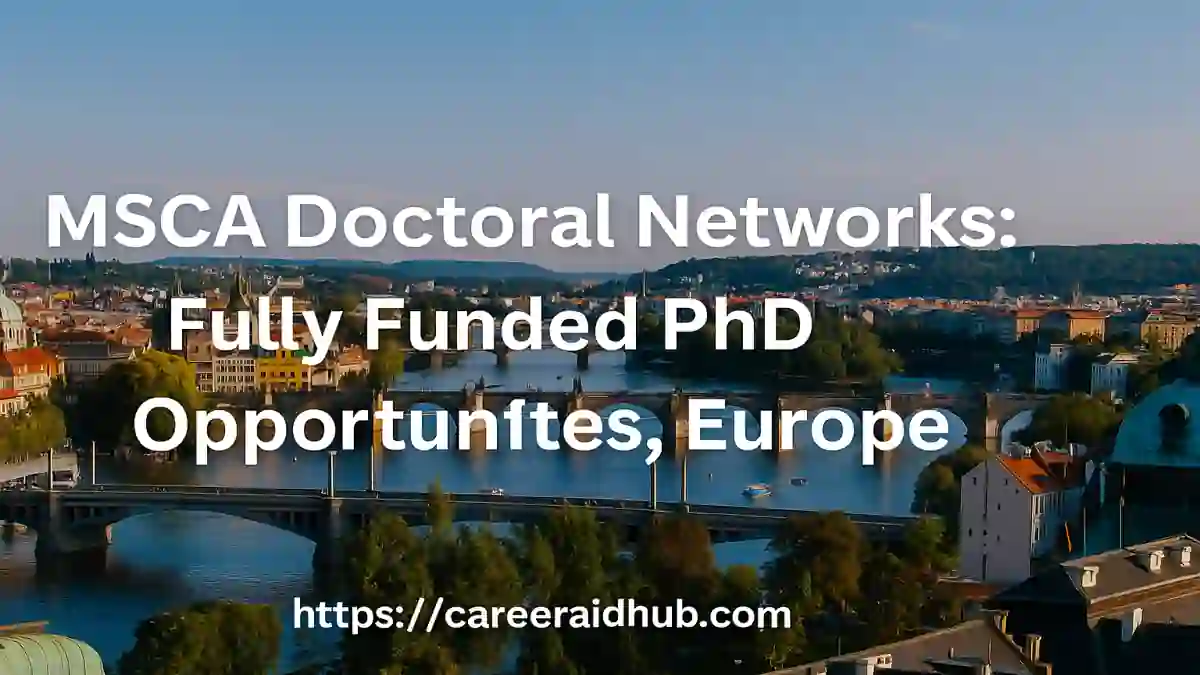MSCA Doctoral Networks 2025: Fully Funded PhD Opportunities in Europe
The Marie Skłodowska-Curie Actions (MSCA) Doctoral Networks 2025 offer one of the most prestigious doctoral opportunities in Europe for early-stage researchers worldwide. Funded by the European Union’s Horizon Europe program, these networks are designed to enhance the quality and structure of doctoral training, fostering a new generation of research talent equipped to meet Europe’s future challenges.
Explore fully funded PhD opportunities across Europe with the MSCA Doctoral Networks 2025. Backed by Horizon Europe, this program supports early-stage researchers through international mobility, cross-sector collaboration, and high-impact doctoral training. It empowers the next generation of global scientists with competitive funding, industry exposure, and world-class mentorship.
MSCA Doctoral Networks emphasize international, interdisciplinary, and intersectoral collaboration, enabling PhD researchers to develop transferable skills and professional networks. Each network is a consortium of universities, research institutions, and private sector partners working together to deliver structured, high-quality research training programs.
What Are MSCA Doctoral Networks?
MSCA Doctoral Networks are collaborative PhD programs that provide structured, interdisciplinary research training across multiple institutions and sectors. Each doctoral network consists of a partnership between:
-
- Academic institutions (universities and research centers)
- Non-academic sectors (industries, SMEs, NGOs)
- International collaborators
These programs are specifically designed to
Types of Doctoral Networks
-
- Standard Doctoral Networks
These are traditional multi-partner academic programs that focus on high-quality research training in a specific field. - Industrial Doctoral Networks
In this format, PhD candidates spend at least 50% of their research time embedded within the non-academic sector. This allows researchers to gain hands-on experience in industry settings while pursuing their academic degree. - Joint Doctorates
These programs offer joint or multiple degrees awarded by at least two higher education institutions. They are ideal for candidates seeking a transnational academic experience.
- Standard Doctoral Networks
All three types promote mobility, interdisciplinarity, and innovation, aligning research training with Europe’s economic and societal needs.
Who Can Apply?
Eligibility Criteria
The MSCA Doctoral Networks have clearly defined eligibility rules that ensure wide participation while maintaining research integrity and training quality.
-
- Early-Stage Researcher (ESR) Requirement: Applicants must not hold a doctoral degree at the time of recruitment. This ensures the program is aimed at new entrants into research.
- Mobility Rule: Candidates must not have lived, worked, or studied in the host country for more than 12 months within the 36 months immediately prior to the recruitment date. This promotes international researcher mobility.
- Open to All Nationalities:The MSCA program is inclusive and does not limit eligibility based on citizenship, fostering diversity in scientific advancement.
- Educational Background: Applicants typically hold a Master’s degree (or equivalent) in a relevant field by the time of recruitment.
These criteria encourage a wide pool of global applicants, making the program highly competitive.
Funding and Benefits
The MSCA Doctoral Networks offer a generous and well-structured funding package designed to support PhD candidates throughout their research journey.
| Component | Details |
|---|---|
| Monthly Living Allowance | Approximately €3,400/month (adjusted based on country correction coefficient) |
| Mobility Allowance | €600/month |
| Family Allowance | €660/month (if applicable, depending on the candidate’s situation) |
| Research, Training, Networking | Fully covered by the project budget |
| Employment Contract | 36–48 months of full-time employment under national employment law |
Additional Advantages
-
- No Tuition Fees: Enrollment costs at host institutions are covered by the program.
- Social Security: Participants are entitled to social security benefits, including healthcare and parental leave.
- Mentorship and Supervision: Dual or joint academic and industry supervision enhances the training quality.
- Networking and Conferences: Access to consortium-wide events, workshops, and international research dissemination platforms.
These benefits make MSCA one of the most comprehensive and competitive PhD funding programs globally.
Key Features of MSCA Doctoral Networks
MSCA Doctoral Networks are structured to offer a unique blend of academic excellence and professional development.
International Mobility
PhD fellows will work in a country different from their current residence, encouraging cultural exchange and global research perspectives.
Intersectoral Exposure
Many projects include placements in industry or non-academic organizations, which provide insight into practical applications and future career opportunities.
Interdisciplinary Training
Research topics often cross disciplinary boundaries, allowing researchers to tackle complex global challenges with multifaceted approaches.
Structured Career Development
The program includes training in transferable skills such as communication, project management, research ethics, and entrepreneurship, increasing employability in both academic and non-academic sectors.
How to Find Open Positions
Although the European Commission funds the MSCA Doctoral Networks, individual PhD positions are advertised and recruited by the project consortia.
Steps to Apply:
-
- Visit the EU Funding & Tenders Portal
Access current MSCA Doctoral Networks projects andtheir associated open calls.
Browse the EURAXESS Job Portal
This platform aggregates academic and research jobs across Europe. Use filters like “MSCA Doctoral Networks” or “PhD 2025”.
Check Consortium and University Websites
Each participating project often has a dedicated page outlining the positions available, requirements, and application deadlines. - Join MSCA Email Alerts or Newsletters
Subscribe to project or institutional mailing lists to stay informed about upcoming openings.
- Visit the EU Funding & Tenders Portal
Make sure to tailor each application to the specific research topic, institution, and supervisor requirements listed.
Expected Timeline (2025–2026 Cycle)
| Stage | Timeline Estimate |
|---|---|
| Call for Projects Launch | Mid 2025 (tentative) |
| Project Approval and Listing | Late 2025 |
| PhD Recruitment Period | Late 2025 to Early 2026 |
| PhD Start Date | From Early to Mid 2026 |
Note: Exact deadlines for each project vary by consortium. This page will be updated as new opportunities are published.
Tips for a Strong Application
The MSCA Doctoral Networks are highly competitive. To enhance your application, consider the following:
-
- Customize Your Application: Align your academic background and research interests with the specific project and host institution.
- Craft a Strong Motivation Letter: Highlight your passion for the topic, previous research experience, and why the MSCA environment aligns with your goals.
- Demonstrate International Readiness: Showcase your ability to adapt to different cultures and collaborate across borders.
- Emphasize Transferable Skills: Include experience in teamwork, communication, data analysis, or project management.
- Follow Guidelines Meticulously: Each project has unique application procedures and document requirements.
Seek feedback from mentors and peers before submission to refine your documents and ensure clarity.
Official Source
The official program details and updates can be accessed on the European Commission MSCA Doctoral Networks portal:
Conclusion
The MSCA Doctoral Networks 2025 represent an unparalleled opportunity for early-stage researchers to embark on a fully funded, internationally recognized PhD program. With a focus on mobility, cross-sectoral experience, and high-level research, the program is a launchpad for a successful global research career. Whether you’re an aspiring academic or looking toward industry, MSCA prepares you to lead and innovate.
Be sure to monitor official listings and prepare your application documents in advance.
Source: European Commission – Marie Skłodowska-Curie Actions Doctoral Networks
Feature Summary
| Feature | Details |
|---|---|
| Program Name | Marie Skłodowska-Curie Actions (MSCA) Doctoral Networks |
| Host Country | European Union Member States and Associated Countries |
| Funded By | European Commission (Horizon Europe) |
| Duration | 36 to 48 months |
| Study Mode | Full-time, in-person (international mobility required) |
| Eligibility | Early-stage researchers; all nationalities |
| Financial Support | Monthly living allowance, mobility allowance, family allowance, research and travel costs |
| Fields of Study | Science, Engineering, Health, Environment, AI, Social Sciences, etc. |
| Deadline | Varies by project – estimated from Fall 2025 to early 2026 |
| Official Website | Marie-Sklodowska-Curie-Actions |
CareerAidHub Support for MSCA Applications
Navigating the MSCA application process can be challenging, especially for first-time applicants. CareerAidHub offers end-to-end support for aspiring researchers targeting international opportunities.
Our Services Include:
-
- SOP and Research Proposal Writing: Tailored to the host institution and project theme.
- CV and Motivation Letter Review: Highlight your unique strengths and align with project expectations.
- One-on-One PhD Application Mentoring: Personalized guidance from experts with successful MSCA backgrounds.
To explore our premium services, visit: https://careeraidhub.com/careeraidhub-premium/
Frequently Asked Questions
MSCA Doctoral Networks offer fully funded PhD positions in Europe, combining research training, mobility, and industry exposure under the Marie Skłodowska-Curie Actions framework.
You qualify as an early-stage researcher if you do not hold a PhD and meet the mobility rule for the specific host country.
Yes, MSCA Doctoral Networks provide a living allowance, mobility allowance, and research support for international PhD students, regardless of nationality or country of origin.
MSCA PhD fellows receive a competitive monthly living allowance, mobility allowance, and, when applicable, a family allowance, plus social security and research-related funding.
Yes, Indian students can apply, provided they meet the early-stage researcher and mobility criteria for the specific MSCA Doctoral Network project.
Typically, you prepare a CV, academic transcripts, motivation letter, research statement and contact details for referees, following each project’s specific guidelines.
MSCA Doctoral Networks are very competitive because they offer excellent funding, structured training, and strong career prospects across academic and non-academic sectors.
Yes, an MSCA PhD significantly boosts your academic profile through publications, international mobility, industry links and transferable skills training, strengthening future postdoc and faculty applications.
Premium Mentorship for a Stronger Application
- Premium Mentorship: personalised 1:1 guidance for this and similar opportunities
- In-depth review of your CV, academic profile, and key statements
- Aligned with international selection criteria so your profile matches what panels expect
- Stronger, more compelling narrative for highly competitive calls
- Step-by-step support from opportunity mapping to final submission (fee-based)










